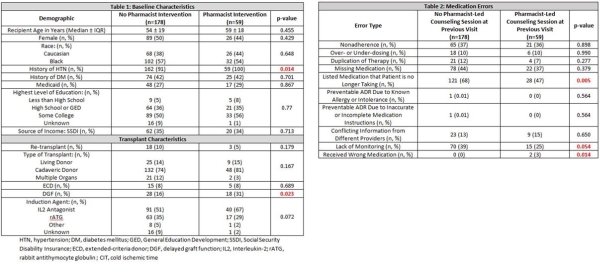Pharmacist Impact on Medication Errors in a Chronic Kidney Transplant Clinic.
1Pharmacy, The Medical University of South Carolina, Charleston, SC
2Transplant Nephrology, The Medical University of South Carolina, Charleston, South Carolina.
Meeting: 2016 American Transplant Congress
Abstract number: 333
Keywords: Adverse effects, Immunosuppression, Kidney transplantation
Session Information
Session Name: Concurrent Session: Medication Errors, Variability and Adherence
Session Type: Concurrent Session
Date: Monday, June 13, 2016
Session Time: 4:30pm-6:00pm
 Presentation Time: 4:42pm-4:54pm
Presentation Time: 4:42pm-4:54pm
Location: Room 302
Medication errors are associated with increased incidence of infection, rejection, and graft loss in kidney transplant recipients. This study aims to assess the impact of a pharmacist encounter on the number of medication errors discovered at the following clinic visit.
This was a prospective, blinded observational study in adult kidney transplant recipients ≥ 90 days post-transplant. Through a medication history encounter, pharmacists documented medication errors discovered at the clinic visit. Errors were categorized as nonadherence, over- or under-dosing, duplication of therapy, missing medication, preventable adverse drug reaction (ADR) due to allergy/ intolerance or due to inaccurate medication instructions, conflicting information from providers, lack of monitoring, and receipt of an incorrect medication. The number and type of errors were compared between patients who had a pharmacist visit vs those who did not.
This study included 237 patients. Significant baseline differences included hypertension (HTN) and delayed graft function (DGF) (Table 1). Univariate analysis demonstrated a significant reduction in the proportion of patients with ≥ 2 medication errors (21.7% vs 78.3%, p=0.041), ≥ 3 errors (18% vs 82%, p=0.003) and a trend in ≥ 4 errors (19.6% vs 80.4%, p=0.102), when comparing those with and without a prior pharmacist encounter. The breakdown of errors within groups is displayed in Table 2. There were 693 medication errors (3.8 errors per patient) in the group without a pharmacist encounter versus 181 errors (3.1 errors per patient) in the group with a pharmacist encounter. Significantly fewer patients in the encounter group had errant listed medications (68% vs 47%, p=0.005) and lack of monitoring (39% vs 25%, p=0.054).
This study suggests that an ambulatory pharmacist encounter can reduce the number of medication errors in kidney transplant recipients. These findings strengthen the argument for pharmacist presence in the transplant ambulatory care setting.
 .
.
CITATION INFORMATION: Covert K, Mardis C, Fleming J, Mardis A, Meadows H, Pilch N, Mohan P, Posadas M, Salazar M, Srinivas T, Mour G, Taber D. Pharmacist Impact on Medication Errors in a Chronic Kidney Transplant Clinic. Am J Transplant. 2016;16 (suppl 3).
To cite this abstract in AMA style:
Covert K, Mardis C, Fleming J, Mardis A, Meadows H, Pilch N, Mohan P, Posadas M, Salazar M, Srinivas T, Mour G, Taber D. Pharmacist Impact on Medication Errors in a Chronic Kidney Transplant Clinic. [abstract]. Am J Transplant. 2016; 16 (suppl 3). https://atcmeetingabstracts.com/abstract/pharmacist-impact-on-medication-errors-in-a-chronic-kidney-transplant-clinic/. Accessed February 19, 2026.« Back to 2016 American Transplant Congress
